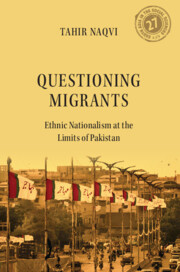Prelude: “This Is Pakistan”
Published online by Cambridge University Press: 13 November 2024
Summary
In the novel Zameen (Land), the Pakistani writer Khadija Mastur tells the story of Sajida, a young woman who has fled to Pakistan around the time of Partition with her ailing father. The fate of her mother is unclear, however, floating in silence above the disordered surface of life in one of Pakistan's refugee camps. The transit camp in Zameen is an inherently unstable space. For Sajida, its offer of refuge is closely hewn to the trauma of what has just been witnessed and the unceasing anticipation of an uncertain future.
One day, Sajida learns that her father has died, leaving her to face the future alone. A young man who is unrelated but close in age approaches her and entreats her: “Baji (sister) come with me. I’ve got a mother. We have a small house and I have no sister. I’ll help you, I’ll….” At this point the man is cut off by the matron of the camp gulley, whose interjecting presence reminds us that the very possibility of such an open encounter between a man and woman is itself a sign of crisis and loss. “Eh Boy! Use your head (aql) when you speak. If a young girl will leave with you, what will the world (duniya) say to that?” One cannot help but feel that the matron is sensing an opportunity for herself. We feel Sajida's world getting darker. The boy responds, “Aunty, this is not the world. This is Pakistan and this is my baji, baji!” (Mastur 1983: 1–10, emphasis mine).
To state that Pakistan is “not the world” and that “you are my sister” is to call emancipated nationality into being in the encounter with catastrophe, through and against which both assume a certain kind of transcendent force. Such immanent or “minor” enactments of Pakistani nationalism are shot through with the force of radical immanence, yielding a structure of feeling that locates national freedom in the subjective imperative to respond and survive. Countering the “world-destroying” effects of Partition (V. Das 2006), embodied in the skepticism of the camp matron, the young man's reply to her takes the form of a series of indexical statements: “this is not the world” … “this is Pakistan” … “she is my sister.”
- Type
- Chapter
- Information
- Questioning MigrantsEthnic Nationalism at the Limits of Pakistan, pp. 25 - 32Publisher: Cambridge University PressPrint publication year: 2025

